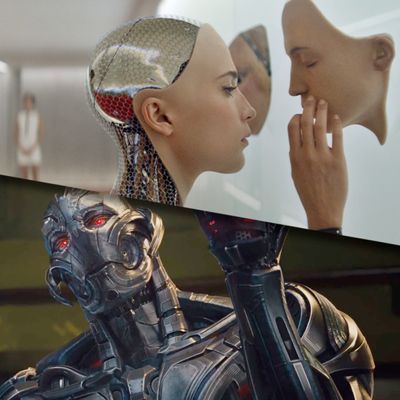
Warning: This post contains spoilers for both Avengers: Age of Ultron and Ex Machina.
As luck would have it, theaters are currently screening two separate movies in which a soft-spoken nerd and a guy with weird facial hair explore the risks of artificial intelligence. The first is Avengers: Age of Ultron, a film you might have heard of. The second is Alex Garland’s fantastic Ex Machina, the story of office drone Caleb (Domhnall Gleeson), who’s tasked with figuring out if the robot his megalomaniac boss Nathan (Oscar Isaac) has created truly has a human consciousness. Unlike Ultron, a character that makes no sense, Ex Machina’s Ava (Alicia Vikander) is one of the year’s most fascinating onscreen creations, a Whirring Robot Dream Girl who expertly straddles the Uncanny Valley. Ultron and Ex Machina are two very different movies, with two very different aims — one is a heady sci-fi movie that wants to explode our notions of gender, the other is a blockbuster so big it was seen as a slight box-office disappointment for having the second-highest opening weekend in history — but it’s worth considering the things that Ex Machina did right, to get a better idea of where Ultron stumbled. Why did one robot work, and one robot didnt’?
Ease up on the technobabble.
Early on in Ex Machina, Nathan tells Caleb to ease up on the programming terms and just give him his straight impressions of Ava. It’s a nifty writing trick, spotlighting Nathan’s slipperiness and need for control while also keeping things grounded for the audience. We don’t really need to know exactly how she works, you know? One line about using Google searches to create her personality is fine. Compare that to Age of Ultron, in which Tony Stark and Bruce Banner have interminable conversations about exactly how they’re going to create Ultron, and then two hours later, have the same conversation about how they’re going to create Vision. My audience had no idea what they were talking about, and I’d venture Robert Downey Jr. and Mark Ruffalo didn’t either. It’s basically gibberish, and it stops the movie in its paces.
Slow it down.
With dozens of characters to service, Joss Whedon doesn’t waste any time getting into Age of Ultron’s plot: After being “born,” Ultron has about five seconds of childlike awe in him before embarking on his evil plan. The movie didn’t need Ex Machina’s hour of tension about the AI’s true nature — when the movie’s called Age of Ultron, you know he’s going to be a baddie — but some exploration of Ultron’s raging daddy issues would have been worthwhile. In Ex Machina, Ava has a very clear reason why she feels the way she does toward Nathan: He’s keeping her locked in his basement, and he’s going to cannibalize her for parts once Caleb is gone. Why does Ultron hate Tony Stark, besides the fact that he’s a villain and that’s what villains do?
Give it a personality, not a persona.
Thanks to James Spader’s voice work, Ultron more than holds his own in his scenes with the Avengers. But he never really feels like a robot; he’s just an asshole who makes jokes about not being physically able to throw up. (Some have made the argument that that’s Ultron inheriting the characteristics of his creator, Tony Stark, the same way that Ava inherited Nathan’s craftiness and amorality.) Part of that is physical: While Ava moves with an inhuman stillness, Ultron has the odd weightlessness that defines blockbuster CGI these days. But it’s also emotional. The AI in Ex Machina are purposefully blank, but underneath that exterior, each was a passionate advocate for its own existence — does Ultron feel the same way? How does being everywhere at once affect his consciousness? We never learn. For all their anonymity, the Ultron copies at the climax might as well have been reskinned versions of the Chitauri from the first Avengers.
Clear up the plan.
Quick — can you describe Ultron’s plan in one sentence? Here’s my go: Ultron is tasked with saving humanity, but after learning about war, he decides the only way to do that is to kill them all off by replacing them with an army of robots, building another robot with human flesh (?) and then dropping a homemade meteor on Earth. Now try to do the same thing to Ava. It’s easy: She’s trapped in a prison and wants to escape by any means necessary. If nothing else, shouldn’t a robot villain’s evil plan be more logical than its human counterparts’?


